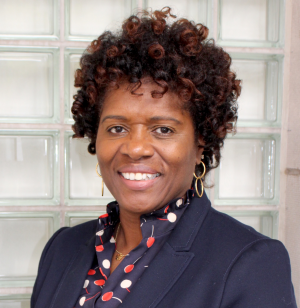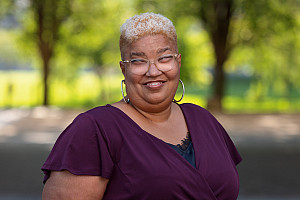New DEI leaders aim to empower student voices
By IUPUI Today
November 14, 2023
Two leaders have joined the Division of Diversity, Equity and Inclusion on the Indianapolis campus within the past six months. Mercedes Cannon serves as director of Accessible Educational Services, and Katherine Betts is assistant vice chancellor for student diversity, equity and inclusion.
IUPUI Today talked to Cannon and Betts about their respective roles, how faculty and staff can support their mission and how their goals support the IU Indianapolis 2030 strategic plan.
Mercedes Cannon

Her tenure in the position began Oct. 2, but as an alumna, she is not new to the office or the campus.
Cannon has a bachelor’s degree in Africana studies and sociology, a leadership certification in organizational leadership and supervision, a master’s in educational counseling, and a Ph.D. in urban education studies with an emphasis on disability studies from IUPUI.
“I returned to higher education in 2009 as a nontraditional student,” she said. “I initially chose to attend college following high school graduation, but instead of continuing my studies, I decided to marry, start a family and establish my own business: an exclusive hair salon catering to Black women.
“During that time, I frequently encountered women facing challenges with their children’s educational experiences, particularly related to being diagnosed with high-incidence disability categories. These conversations inspired me to return to college and pursue a counseling degree. I aimed to develop my empathetic listening skills and assist women navigating various difficulties in their lives and walking with them through their challenges.”
While earning her degrees, she also progressed as an employee of Accessible Educational Services, then called Adaptive Educational Services. She rose from a student worker to associate director, and she worked as an interim director for eight months.
In the summer of 2022, Cannon left IUPUI to join Syracuse University as a post-doctoral researcher and explore a faculty track. The experience made her realize she missed the work she did with AES.
“At Syracuse, I realized that the work I loved was the professional staff work I was doing before I left,” she said. “Now, I can use my lived experiences, scholarship and leadership skills even more intentionally in the role of director, which requires having more strategic relationships and interactions with faculty, staff, students, affinity groups on campus, technical centers and other places to build what I call an Accessible Educational Services ‘community of practice.’
“Within a community of practice, the focus extends beyond disabled individuals or those with a disability. It encompasses everyone sharing their experiences, listening to others’ stories, facilitating access, offering support, learning collaboratively and ultimately contributing to the community.”
Student support and strengthening equity, two objectives of the student success pillar of the IU 2030 strategic plan, are also core tenets of the Accessible Educational Services mission.
“As the sole office on campus entrusted with the responsibility and authority to assess qualifications and arrange appropriate accommodations for students with disabilities, we collaborate closely with the primary academic unit to implement these accommodations,” Cannon said. “Our approach is grounded in the Americans with Disabilities Act and a deep respect for the student’s humanity, ensuring their needs are met effectively and reasonably.
“We must work together to ensure student voices are heard and respected, not only amongst the staff in Accessible Educational Services but also amongst peers and staff outside our office who work alongside us in serving students in different capacities. Students must have a sense of belonging without having to ask.”
While Accessible Educational Services specifically serves disabled students and those with diagnosed disabilities, they are open to talking with all students.
“We’re in conversation with all students,” Cannon said. “Feel free to contact us; your conversations with us are confidential. We are happy to address any inquiries and offer referrals if needed. We recognize that some students might not identify as disabled or have a formal diagnosis, yet they may have questions about their experiences. We are here to provide information and connect you with appropriate resources.”
Accessible Educational Services is in Taylor Hall, Room UC100. Hours, contact information and guidance on accommodation requests can be found on the Division of Diversity, Equity and Inclusion website.
Katherine Betts

Betts previously served as diversity, equity, inclusion and belonging officer and director of bias response at California State University-Sacramento. Before that, she held a variety of positions at Ohio State University, University of Iowa and Oregon State University. She earned a Ph.D. in higher education, leadership and administration from the University of Toledo and a master’s degree in student affairs administration from Indiana State University.
“Coming back to the state was kind of like coming back full circle because I began my career as a student affairs professional in the state of Indiana,” she said.
Building relationships and learning university and campus processes were among her first priorities.
“I’ve been meeting stakeholders, listening and getting to know the wonderful team in the Multicultural Center and LGBTQ+ Center, as well as the broader team in the division,” she said. “I am working to learn and understand our areas of strength and identify areas that can be strengthened. I also want to make sure that I am elevating the work of the centers and the division and looking for new ways to do that.”
Betts also has new plans for involving and informing the greater campus community.
“Each quarter, I plan on giving an impact report on the progress of initiatives within the student diversity portfolio — not only to keep the vice chancellor and other stakeholders apprised of what we are doing, but to amplify the work that’s happening and demonstrate its alignment with other student success initiatives,” she said. “I also want to use the report to strengthen existing partnerships and find new pathways to collaborations. Having specific data and outcomes to share and discuss will help build bridges with faculty, staff and other departments.
“People are already excited to work with our area. As we drill down even more into very specific details about what we’re doing and how it’s aligning with student success and other parts of the IU 2030 strategic plan, I think people can see parts of themselves in the work and want to join us.”
Betts aims to not just support students but empower them to find their voices.
“First, I want students to know that I am here to listen and help, whether it is facilitating conversations, evaluating processes or creating spaces to discuss student experiences around belonging or not belonging,” she said. “We must be able to unpack those things, critically examine them and work as an institution to create pathways to strengthen student belonging. I see my role as a critical piece in that.
“Second, I am a Black female with a disability, and as a student I attended a predominantly white institution, which shaped my experiences of having to navigate institutional processes, microaggressions and other forms of oppression. Those experiences and my involvement as a student leader helped me find my voice, which led to my desire to be a voice at the table and make room for student voices as we consider policies, practices and things that impact their experiences.”